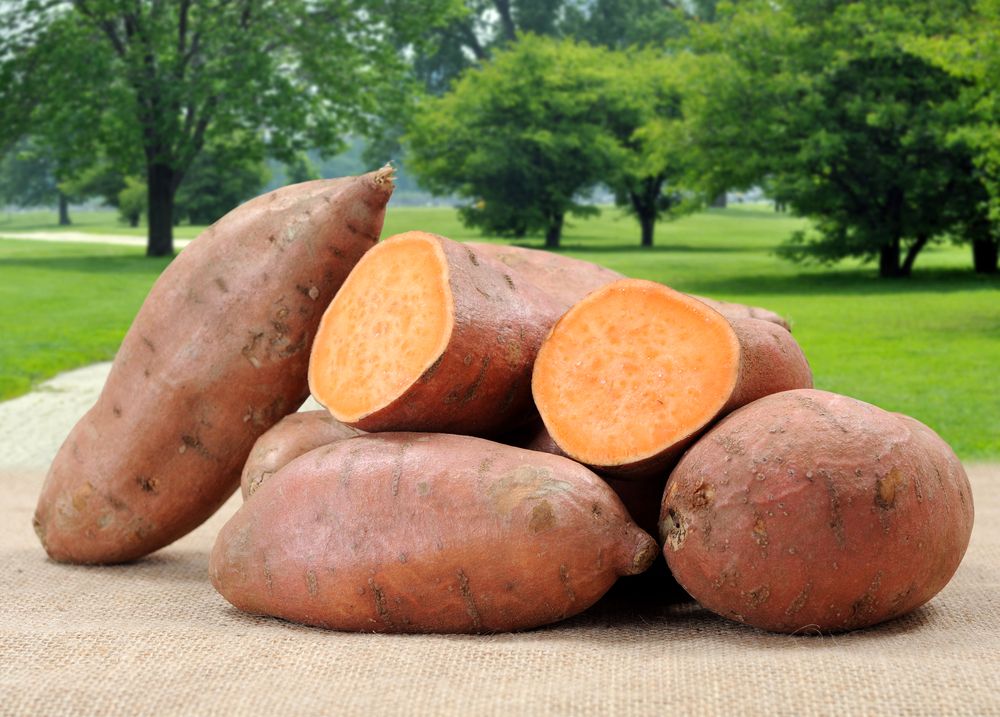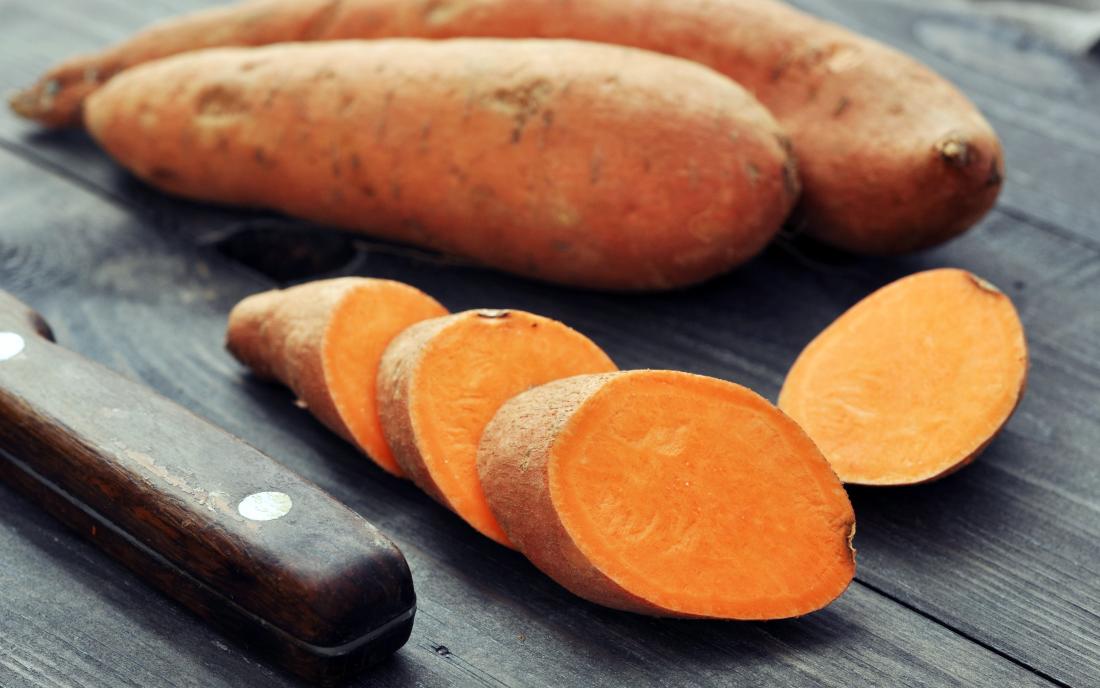These nutritional all-stars can help improve your protect against chronic diseases, regular blood sugar, and more.
Sweet potatoes are starchy tubers known for their brilliant orange hue. In the fall, sweet potatoes become particularly appealing as a hearty side dish and an ingredient in everything from soups and stews to pies and other desserts.
The colorful roots offer some pretty impressive health perks. Consuming sweet potatoes may protect against chronic diseases and fight inflammation. Also, sweet potatoes help regulate blood sugar levels and support weight loss.
Here are some benefits of sweet potatoes and simple ways to healthfully incorporate them into your everyday meals, snacks, and treats.
Benefits
Research has found that sweet potatoes may have several health benefits. Some of those benefits include protecting against chronic diseases, fighting inflammation, regulating blood sugar levels, and supporting weight loss.
Might Protect Against Chronic Diseases

Many nutrients found in sweet potatoes, like vitamins C and E, act as powerful antioxidants. For even more antioxidants, choose purple sweet potatoes. The pigment that gives them their hue has particularly potent antioxidant properties.1
Antioxidants might protect against several chronic diseases, like cardiovascular diseases and cancer. They may also help fight free radical damage, though research is inconclusive. Free radicals are harmful substances that increase your risk of chronic diseases.2
Helps Fight Inflammation

Natural anti-inflammatory compounds in sweet potatoes help reduce inflammation at the cellular level. Research has found that sweet potatoes, specifically purple ones, can offer anti-inflammatory properties.3
Unchecked, low-grade inflammation raises the risk of several chronic diseases, including obesity, type 2 diabetes, and cardiovascular disease.4
Regulates Blood Sugar Levels

Some may regard sweet potatoes as too starchy. Still, their high fiber content makes them a slow-burning starch. And don’t be afraid to incorporate the potato skin (also known as the potato jacket) into your recipes for extra nutrients and antioxidants.
In fact, one cup of baked sweet potato provides about three grams of fiber.5 The daily recommended fiber intake for women and men is 25 grams and 38 grams, respectively.6
High-fiber foods help lower your type 2 diabetes risk. Fiber causes your intestines to slowly absorb sugar, helping maintain healthy blood sugar levels. For that reason, fiber is also good for people with diabetes.6
Might Support Weight Loss

Sweet potatoes are a great source of resistant starch,7 which is a filling, fiber-like substance your body doesn’t digest and absorb.
One study published in 2014 in Critical Reviews in Food Science and Nutrition identified several ways resistant starch could help lose and maintain weight. For example, resistant starch increases the release of peptides, which tell your body you’re full. Also, resistant starch decreases the amount of fat that your body stores.8
High body weight and obesity are some of the most common risk factors for chronic diseases like cardiovascular disease and diabetes. So, maintaining healthy body weight is key to mitigating those health conditions.9
Sweet Potato Nutrition
One five-inch-long sweet potato provides the following nutrients:5
- Calories: 112
- Fat: 0.065g
- Sodium: 71.5mg
- Carbohydrates: 26.1g
- Fiber: 3.9g
- Added sugars: 0g
- Protein: 2.04g
Also, one sweet potato provides several nutrients, such as vitamins A and C, manganese, potassium, and beta-carotene. They also contain healthy minerals such as calcium, iron, magnesium, and copper.
Vitamins A and C support immune function, especially during cold and flu season. Do note that regularly consuming vitamins A and C doesn’t prevent colds. Still, those nutrients can reduce how long and severe cold symptoms will be if you get sick.10
Manganese is a mineral that also supports your immune system and other processes, like digestion, blood sugar regulation, and bone growth.11 Potassium plays key roles in nerve function, muscle contraction, and heart rhythm regulation. Also, potassium moves nutrients into and wastes out of your cells.12
The orange color of sweet potatoes contains ample amount of beta-carotene which has antioxidant properties and important for eye health.13
Risks

Generally, sweet potatoes don’t pose many risks if you eat them in moderation. Excessively consuming sweet potatoes may increase your risk of kidney stones. Sweet potatoes are high in oxalate, a naturally-occurring molecule in many foods know to exacerbate kidney stones.14 You can minimize these risks by paring sweet potatoes with mixed greens or vegetables and drinking plenty of water. Nonetheless, people prone to kidney stones or with chronic kidney problems might limit their intake of high-oxalate foods like sweet potatoes, and speak with a healthcare provider if they have concerns.
Tips for Consuming Sweet Potatoes

There are many ways to prepare sweet potatoes. Here are a few simple suggestions:
- Bake sweet potatoes and drizzle them with a combo of ground cinnamon and maple syrup thinned with warm water.
- You can also bake, mash, and fold sweet potatoes into overnight oats.
- Whip cooked sweet potatoes into a smoothie as a healthy and colorful ingredient.
- Bake sweet potatoes with salmon to make a delicious lunch bowl.
- Purée cooked sweet potatoes with low-sodium organic veggie broth as the base for a soup.
- Add chunked, baked sweet potatoes to a garden salad.
- Satisfy a French fry craving with crisp oven-baked sweet potato wedges.
- Mashed sweet potato also makes a fantastic addition to desserts and treats, from no-bake cookies to brownies, pudding, and sweet potato pie.
A Quick Review
Sweet potatoes can boost your intake of important vitamins, minerals, and antioxidants. Also, sweet potatoes may help with inflammation, blood sugar spikes, and blood pressure. You can get your filling of sweet potatoes in all kinds of dishes, from salty to sweet or a bit of both
Source: https://www.health.com







